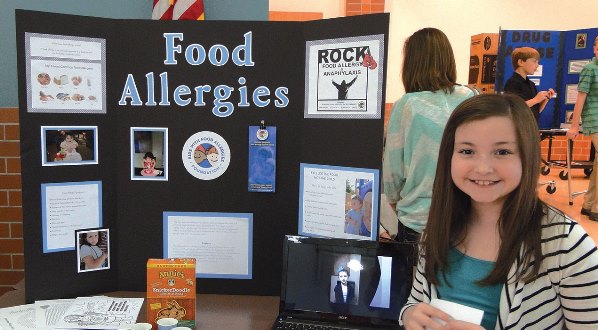About KFA

Teaching School Children about Food Allergies
How Your Support Raised Awareness of Eosinophilic Disorder
With the annual “Make a Difference” fair right around the corner, sixth graders at Scott Middle School in Lincoln, Nebraska, were assigned the task of researching and then making a presentation about an organization that is important to them. Maci Flood, 12, knew immediately which one she was going to pick: Kids With Food Allergies.
The Flood family—Maci and her little sister, Ava, 8, along with parents Katie and Nate—are longtime KFA supporters. Ava has an allergic swallowing disorder called eosinophilic esophagitis (EoE) [3]. EoE occurs when a type of white blood cell called an eosinophil collects in the esophagus. Typically triggered by food allergens, an elevation of eosinophils causes internal damage and inflammation, making it hard to swallow. Ava, who started drinking an elemental formula when she was three weeks old, continues to avoid beef, milk, gluten and corn products.
 “The support groups at KFA helped my family tremendously when my sister was really little,” says Maci, who, as a baby, had milk soy protein intolerance, which is a temporary inability to digest the proteins found in cow’s milk and soy products. For the “Make a Difference” project, students chose social problems to research, with an eye towards picking a topic that meant something to them personally and about which they wanted to educate the public. The projects took the students several months to complete. Maci featured her sister in a video interview; created a PowerPoint presentation showing myths and facts about food allergies as well as celebrities with food allergies; and prepared handouts, such as a food allergy maze and a word search. Students were also required to complete a research paper and prepare an oral presentation.
“The support groups at KFA helped my family tremendously when my sister was really little,” says Maci, who, as a baby, had milk soy protein intolerance, which is a temporary inability to digest the proteins found in cow’s milk and soy products. For the “Make a Difference” project, students chose social problems to research, with an eye towards picking a topic that meant something to them personally and about which they wanted to educate the public. The projects took the students several months to complete. Maci featured her sister in a video interview; created a PowerPoint presentation showing myths and facts about food allergies as well as celebrities with food allergies; and prepared handouts, such as a food allergy maze and a word search. Students were also required to complete a research paper and prepare an oral presentation.
In her video interview, Ava talks about what it is like to have food allergies, particularly the sadness that comes from being unable to eat ice cream or popcorn with butter at the movies with other children. However, she adds, “I also feel happy because it makes me feel unique. A lot of kids get treated differently because of their allergies. Thankfully I don’t. People like me for me, and not for my food allergies.” At the fair, which was held last March, students displayed their projects and talked about what particular organizations meant to them. Visitors had the opportunity to contribute to the organizations, and Maci raised $100 for KFA!
Maci, Ava and their mom, Katie, all agree that the support KFA offered when Ava was a baby was invaluable. In a message to KFA, Katie wrote: “I was exhausted, stressed and worried about my child’s future. The KFA message boards offered insight and a sense of belonging. I didn’t feel like I was alone.”
When they are not educating others about food allergies and eosinophilic disorders, Maci and Ava are energetic girls. Under the watchful eyes of their parents, who are both police officers, Ava dances and Maci does gymnastics. Both Katie and Nate have food allergies as well. Katie is allergic to bananas and has asthma, and Nate is allergic to seafood. “We didn’t know when we fell in love that it would impact our children,” joked Katie, referring to the genetic nature of food allergies. Maci, who wants to be a pediatric dentist when she grows up, credits KFA with making a difference in her family’s life when it was turned upside down by the strict food avoidance that eosinophilic disorders require to stay healthy. “KFA’s support groups really helped my family during the worst point in Ava’s food allergies,” she said.
Support Our Work
With your support, we advocate for public policies to help keep children with food allergies safe. It is because of donors like you that we are also able to teach families to prevent emergencies and what to do should one occur.
Donate Today > [13]
